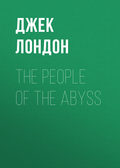
Джек Лондон
Мартин Иден / Martin Eden
Chapter XXXVII
The first thing Martin did next morning was to go counter both to Brissenden’s advice and command. «The Shame of the Sun» he wrapped and mailed to The Acropolis. He believed he could find magazine publication for it, and he felt that recognition by the magazines would commend him to the book-publishing houses. «Ephemera» he likewise wrapped and mailed to a magazine. Despite Brissenden’s prejudice against the magazines, which was a pronounced mania with him, Martin decided that the great poem should see print. He did not intend, however, to publish it without the other’s permission. His plan was to get it accepted by one of the high magazines, and, thus armed, again to wrestle with Brissenden for consent.
Martin began, that morning, a story which he had sketched out a number of weeks before and which ever since had been worrying him with its insistent clamor to be created. Apparently it was to be a rattling sea story, a tale of twentieth-century adventure and romance, handling real characters, in a real world, under real conditions. But beneath the swing and go of the story was to be something else-something that the superficial reader would never discern and which, on the other hand, would not diminish in any way the interest and enjoyment for such a reader. It was this, and not the mere story, that impelled Martin to write it. For that matter, it was always the great, universal motif that suggested plots to him. After having found such a motif, he cast about for the particular persons and particular location in time and space wherewith and wherein to utter the universal thing. «Overdue» was the title he had decided for it, and its length he believed would not be more than sixty thousand words-a bagatelle for him with his splendid vigor of production. On this first day he took hold of it with conscious delight in the mastery of his tools. He no longer worried for fear that the sharp, cutting edges should slip and mar his work. The long months of intense application and study had brought their reward. He could now devote himself with sure hand to the larger phases of the thing he shaped; and as he worked, hour after hour, he felt, as never before, the sure and cosmic grasp with which he held life and the affairs of life. «Overdue» would tell a story that would be true of its particular characters and its particular events; but it would tell, too, he was confident, great vital things that would be true of all time, and all sea, and all life-thanks to Herbert Spencer, he thought, leaning back for a moment from the table. Ay, thanks to Herbert Spencer and to the master-key of life, evolution, which Spencer had placed in his hands.
He was conscious that it was great stuff he was writing. «It will go! It will go!» was the refrain that kept, sounding in his ears. Of course it would go. At last he was turning out the thing at which the magazines would jump. The whole story worked out before him in lightning flashes. He broke off from it long enough to write a paragraph in his note-book. This would be the last paragraph in «Overdue»; but so thoroughly was the whole book already composed in his brain that he could write, weeks before he had arrived at the end, the end itself. He compared the tale, as yet unwritten, with the tales of the sea-writers, and he felt it to be immeasurably superior. «There’s only one man who could touch it,» he murmured aloud, «and that’s Conrad. And it ought to make even him sit up and shake hands with me, and say, ‘Well done, Martin, my boy.’»
He toiled on all day, recollecting, at the last moment, that he was to have dinner at the Morses’. Thanks to Brissenden, his black suit was out of pawn and he was again eligible for dinner parties. Down town he stopped off long enough to run into the library and search for Saleeby’s books. He drew out «The Cycle of Life,» and on the car turned to the essay Norton had mentioned on Spencer. As Martin read, he grew angry. His face flushed, his jaw set, and unconsciously his hand clenched, unclenched, and clenched again as if he were taking fresh grips upon some hateful thing out of which he was squeezing the life. When he left the car, he strode along the sidewalk as a wrathful man will stride, and he rang the Morse bell with such viciousness that it roused him to consciousness of his condition, so that he entered in good nature, smiling with amusement at himself. No sooner, however, was he inside than a great depression descended upon him. He fell from the height where he had been up-borne all day on the wings of inspiration. «Bourgeois,» «trader’s den»-Brissenden’s epithets repeated themselves in his mind. But what of that? he demanded angrily. He was marrying Ruth, not her family.
It seemed to him that he had never seen Ruth more beautiful, more spiritual and ethereal and at the same time more healthy. There was color in her cheeks, and her eyes drew him again and again-the eyes in which he had first read immortality. He had forgotten immortality of late, and the trend of his scientific reading had been away from it; but here, in Ruth’s eyes, he read an argument without words that transcended all worded arguments. He saw that in her eyes before which all discussion fled away, for he saw love there. And in his own eyes was love; and love was unanswerable. Such was his passionate doctrine.
The half hour he had with her, before they went in to dinner, left him supremely happy and supremely satisfied with life. Nevertheless, at table, the inevitable reaction and exhaustion consequent upon the hard day seized hold of him. He was aware that his eyes were tired and that he was irritable. He remembered it was at this table, at which he now sneered and was so often bored, that he had first eaten with civilized beings in what he had imagined was an atmosphere of high culture and refinement. He caught a glimpse of that pathetic figure of him, so long ago, a self-conscious savage, sprouting sweat at every pore in an agony of apprehension, puzzled by the bewildering minutiae of eating-implements, tortured by the ogre of a servant, striving at a leap to live at such dizzy social altitude, and deciding in the end to be frankly himself, pretending no knowledge and no polish he did not possess.
He glanced at Ruth for reassurance, much in the same manner that a passenger, with sudden panic thought of possible shipwreck, will strive to locate the life preservers. Well, that much had come out of it-love and Ruth. All the rest had failed to stand the test of the books. But Ruth and love had stood the test; for them he found a biological sanction. Love was the most exalted expression of life. Nature had been busy designing him, as she had been busy with all normal men, for the purpose of loving. She had spent ten thousand centuries-ay, a hundred thousand and a million centuries-upon the task, and he was the best she could do. She had made love the strongest thing in him, increased its power a myriad per cent with her gift of imagination, and sent him forth into the ephemera to thrill and melt and mate. His hand sought Ruth’s hand beside him hidden by the table, and a warm pressure was given and received. She looked at him a swift instant, and her eyes were radiant and melting. So were his in the thrill that pervaded him; nor did he realize how much that was radiant and melting in her eyes had been aroused by what she had seen in his.
Across the table from him, cater-cornered, at Mr. Morse’s right, sat Judge Blount, a local superior court judge. Martin had met him a number of times and had failed to like him. He and Ruth’s father were discussing labor union politics, the local situation, and socialism, and Mr. Morse was endeavoring to twit Martin on the latter topic. At last Judge Blount looked across the table with benignant and fatherly pity. Martin smiled to himself.
«You’ll grow out of it, young man,» he said soothingly. «Time is the best cure for such youthful distempers.» He turned to Mr. Morse. «I do not believe discussion is good in such cases. It makes the patient obstinate.»
«That is true,» the other assented gravely. «But it is well to warn the patient occasionally of his condition.»
Martin laughed merrily, but it was with an effort. The day had been too long, the day’s effort too intense, and he was deep in the throes of the reaction.
«Undoubtedly you are both excellent doctors,» he said; «but if you care a whit for the opinion of the patient, let him tell you that you are poor diagnosticians. In fact, you are both suffering from the disease you think you find in me. As for me, I am immune. The socialist philosophy that riots half-baked in your veins has passed me by.»
«Clever, clever,» murmured the judge. «An excellent ruse in controversy, to reverse positions.»
«Out of your mouth.» Martin’s eyes were sparkling, but he kept control of himself. «You see, Judge, I’ve heard your campaign speeches. By some henidical process-henidical, by the way is a favorite word of mine which nobody understands-by some henidical process you persuade yourself that you believe in the competitive system and the survival of the strong, and at the same time you indorse with might and main all sorts of measures to shear the strength from the strong.»
«My young man-»
«Remember, I’ve heard your campaign speeches,» Martin warned. «It’s on record, your position on interstate commerce regulation, on regulation of the railway trust and Standard Oil, on the conservation of the forests, on a thousand and one restrictive measures that are nothing else than socialistic.»
«Do you mean to tell me that you do not believe in regulating these various outrageous exercises of power?»
«That’s not the point. I mean to tell you that you are a poor diagnostician. I mean to tell you that I am not suffering from the microbe of socialism. I mean to tell you that it is you who are suffering from the emasculating ravages of that same microbe. As for me, I am an inveterate opponent of socialism just as I am an inveterate opponent of your own mongrel democracy that is nothing else than pseudo-socialism masquerading under a garb of words that will not stand the test of the dictionary.»
«I am a reactionary-so complete a reactionary that my position is incomprehensible to you who live in a veiled lie of social organization and whose sight is not keen enough to pierce the veil. You make believe that you believe in the survival of the strong and the rule of the strong. I believe. That is the difference. When I was a trifle younger,-a few months younger,-I believed the same thing. You see, the ideas of you and yours had impressed me. But merchants and traders are cowardly rulers at best; they grunt and grub all their days in the trough of money-getting, and I have swung back to aristocracy, if you please. I am the only individualist in this room. I look to the state for nothing. I look only to the strong man, the man on horseback, to save the state from its own rotten futility.»
«Nietzsche was right. I won’t take the time to tell you who Nietzsche was, but he was right. The world belongs to the strong-to the strong who are noble as well and who do not wallow in the swine-trough of trade and exchange. The world belongs to the true nobleman, to the great blond beasts, to the noncompromisers, to the ‘yes-sayers.’ And they will eat you up, you socialists-who are afraid of socialism and who think yourselves individualists. Your slave-morality of the meek and lowly will never save you. Oh, it’s all Greek, I know, and I won’t bother you any more with it. But remember one thing. There aren’t half a dozen individualists in Oakland, but Martin Eden is one of them.»
He signified that he was done with the discussion, and turned to Ruth.
«I’m wrought up to-day,» he said in an undertone. «All I want to do is to love, not talk.»
He ignored Mr. Morse, who said:
«I am unconvinced. All socialists are Jesuits. That is the way to tell them.»
«We’ll make a good Republican out of you yet,» said Judge Blount.
«The man on horseback will arrive before that time,» Martin retorted with good humor, and returned to Ruth.
But Mr. Morse was not content. He did not like the laziness and the disinclination for sober, legitimate work of this prospective son-in-law of his, for whose ideas he had no respect and of whose nature he had no understanding. So he turned the conversation to Herbert Spencer. Judge Blount ably seconded him, and Martin, whose ears had pricked at the first mention of the philosopher’s name, listened to the judge enunciate a grave and complacent diatribe against Spencer. From time to time Mr. Morse glanced at Martin, as much as to say, «There, my boy, you see.»
«Chattering daws,» Martin muttered under his breath, and went on talking with Ruth and Arthur.
But the long day and the «real dirt» of the night before were telling upon him; and, besides, still in his burnt mind was what had made him angry when he read it on the car.
«What is the matter?» Ruth asked suddenly alarmed by the effort he was making to contain himself.
«There is no god but the Unknowable, and Herbert Spencer is its prophet,» Judge Blount was saying at that moment.
Martin turned upon him.
«A cheap judgment,» he remarked quietly. «I heard it first in the City Hall Park, on the lips of a workingman who ought to have known better. I have heard it often since, and each time the clap-trap of it nauseates me. You ought to be ashamed of yourself. To hear that great and noble man’s name upon your lips is like finding a dew-drop in a cesspool. You are disgusting.»
It was like a thunderbolt. Judge Blount glared at him with apoplectic countenance, and silence reigned. Mr. Morse was secretly pleased. He could see that his daughter was shocked. It was what he wanted to do-to bring out the innate ruffianism of this man he did not like.
Ruth’s hand sought Martin’s beseechingly under the table, but his blood was up. He was inflamed by the intellectual pretence and fraud of those who sat in the high places. A Superior Court Judge! It was only several years before that he had looked up from the mire at such glorious entities and deemed them gods.
Judge Blount recovered himself and attempted to go on, addressing himself to Martin with an assumption of politeness that the latter understood was for the benefit of the ladies. Even this added to his anger. Was there no honesty in the world?
«You can’t discuss Spencer with me,» he cried. «You do not know any more about Spencer than do his own countrymen. But it is no fault of yours, I grant. It is just a phase of the contemptible ignorance of the times. I ran across a sample of it on my way here this evening. I was reading an essay by Saleeby on Spencer. You should read it. It is accessible to all men. You can buy it in any book-store or draw it from the public library. You would feel ashamed of your paucity of abuse and ignorance of that noble man compared with what Saleeby has collected on the subject. It is a record of shame that would shame your shame.»
«‘The philosopher of the half-educated,’ he was called by an academic Philosopher who was not worthy to pollute the atmosphere he breathed. I don’t think you have read ten pages of Spencer, but there have been critics, assumably more intelligent than you, who have read no more than you of Spencer, who publicly challenged his followers to adduce one single idea from all his writings-from Herbert Spencer’s writings, the man who has impressed the stamp of his genius over the whole field of scientific research and modern thought; the father of psychology; the man who revolutionized pedagogy, so that to-day the child of the French peasant is taught the three R’s according to principles laid down by him. And the little gnats of men sting his memory when they get their very bread and butter from the technical application of his ideas. What little of worth resides in their brains is largely due to him. It is certain that had he never lived, most of what is correct in their parrot-learned knowledge would be absent.»
«And yet a man like Principal Fairbanks of Oxford-a man who sits in an even higher place than you, Judge Blount-has said that Spencer will be dismissed by posterity as a poet and dreamer rather than a thinker. Yappers and blatherskites, the whole brood of them! ‘«First Principles» is not wholly destitute of a certain literary power,’ said one of them. And others of them have said that he was an industrious plodder rather than an original thinker. Yappers and blatherskites! Yappers and blatherskites!»
Martin ceased abruptly, in a dead silence. Everybody in Ruth’s family looked up to Judge Blount as a man of power and achievement, and they were horrified at Martin’s outbreak. The remainder of the dinner passed like a funeral, the judge and Mr. Morse confining their talk to each other, and the rest of the conversation being extremely desultory. Then afterward, when Ruth and Martin were alone, there was a scene.
«You are unbearable,» she wept.
But his anger still smouldered, and he kept muttering, «The beasts! The beasts!»
When she averred he had insulted the judge, he retorted:
«By telling the truth about him?»
«I don’t care whether it was true or not,» she insisted. «There are certain bounds of decency, and you had no license to insult anybody.»
«Then where did Judge Blount get the license to assault truth?» Martin demanded. «Surely to assault truth is a more serious misdemeanor than to insult a pygmy personality such as the judge’s. He did worse than that. He blackened the name of a great, noble man who is dead. Oh, the beasts! The beasts!»
His complex anger flamed afresh, and Ruth was in terror of him. Never had she seen him so angry, and it was all mystified and unreasonable to her comprehension. And yet, through her very terror ran the fibres of fascination that had drawn and that still drew her to him-that had compelled her to lean towards him, and, in that mad, culminating moment, lay her hands upon his neck. She was hurt and outraged by what had taken place, and yet she lay in his arms and quivered while he went on muttering, «The beasts! The beasts!» And she still lay there when he said: «I’ll not bother your table again, dear. They do not like me, and it is wrong of me to thrust my objectionable presence upon them. Besides, they are just as objectionable to me. Faugh! They are sickening. And to think of it, I dreamed in my innocence that the persons who sat in the high places, who lived in fine houses and had educations and bank accounts, were worth while!»
Chapter XXXVIII
«Come on, let’s go down to the local.»
So spoke Brissenden, faint from a hemorrhage of half an hour before-the second hemorrhage in three days. The perennial whiskey glass was in his hands, and he drained it with shaking fingers.
«What do I want with socialism?» Martin demanded.
«Outsiders are allowed five-minute speeches,» the sick man urged. «Get up and spout. Tell them why you don’t want socialism. Tell them what you think about them and their ghetto ethics. Slam Nietzsche into them and get walloped for your pains. Make a scrap of it. It will do them good. Discussion is what they want, and what you want, too. You see, I’d like to see you a socialist before I’m gone. It will give you a sanction for your existence. It is the one thing that will save you in the time of disappointment that is coming to you.»
«I never can puzzle out why you, of all men, are a socialist,» Martin pondered. «You detest the crowd so. Surely there is nothing in the canaille to recommend it to your aesthetic soul.» He pointed an accusing finger at the whiskey glass which the other was refilling. «Socialism doesn’t seem to save you.»
«I’m very sick,» was the answer. «With you it is different. You have health and much to live for, and you must be handcuffed to life somehow. As for me, you wonder why I am a socialist. I’ll tell you. It is because Socialism is inevitable; because the present rotten and irrational system cannot endure; because the day is past for your man on horseback. The slaves won’t stand for it. They are too many, and willy-nilly they’ll drag down the would-be equestrian before ever he gets astride. You can’t get away from them, and you’ll have to swallow the whole slave-morality. It’s not a nice mess, I’ll allow. But it’s been a-brewing and swallow it you must. You are antediluvian anyway, with your Nietzsche ideas. The past is past, and the man who says history repeats itself is a liar. Of course I don’t like the crowd, but what’s a poor chap to do? We can’t have the man on horseback, and anything is preferable to the timid swine that now rule. But come on, anyway. I’m loaded to the guards now, and if I sit here any longer, I’ll get drunk. And you know the doctor says-damn the doctor! I’ll fool him yet.»
It was Sunday night, and they found the small hall packed by the Oakland socialists, chiefly members of the working class. The speaker, a clever Jew, won Martin’s admiration at the same time that he aroused his antagonism. The man’s stooped and narrow shoulders and weazened chest proclaimed him the true child of the crowded ghetto, and strong on Martin was the age-long struggle of the feeble, wretched slaves against the lordly handful of men who had ruled over them and would rule over them to the end of time. To Martin this withered wisp of a creature was a symbol. He was the figure that stood forth representative of the whole miserable mass of weaklings and inefficients who perished according to biological law on the ragged confines of life. They were the unfit. In spite of their cunning philosophy and of their antlike proclivities for coöperation, Nature rejected them for the exceptional man. Out of the plentiful spawn of life she flung from her prolific hand she selected only the best. It was by the same method that men, aping her, bred race-horses and cucumbers. Doubtless, a creator of a Cosmos could have devised a better method; but creatures of this particular Cosmos must put up with this particular method. Of course, they could squirm as they perished, as the socialists squirmed, as the speaker on the platform and the perspiring crowd were squirming even now as they counselled together for some new device with which to minimize the penalties of living and outwit the Cosmos.
So Martin thought, and so he spoke when Brissenden urged him to give them hell. He obeyed the mandate, walking up to the platform, as was the custom, and addressing the chairman. He began in a low voice, haltingly, forming into order the ideas which had surged in his brain while the Jew was speaking. In such meetings five minutes was the time allotted to each speaker; but when Martin’s five minutes were up, he was in full stride, his attack upon their doctrines but half completed. He had caught their interest, and the audience urged the chairman by acclamation to extend Martin’s time. They appreciated him as a foeman worthy of their intellect, and they listened intently, following every word. He spoke with fire and conviction, mincing no words in his attack upon the slaves and their morality and tactics and frankly alluding to his hearers as the slaves in question. He quoted Spencer and Malthus, and enunciated the biological law of development.
«And so,» he concluded, in a swift rèsumè, «no state composed of the slave-types can endure. The old law of development still holds. In the struggle for existence, as I have shown, the strong and the progeny of the strong tend to survive, while the weak and the progeny of the weak are crushed and tend to perish. The result is that the strong and the progeny of the strong survive, and, so long as the struggle obtains, the strength of each generation increases. That is development. But you slaves-it is too bad to be slaves, I grant-but you slaves dream of a society where the law of development will be annulled, where no weaklings and inefficients will perish, where every inefficient will have as much as he wants to eat as many times a day as he desires, and where all will marry and have progeny-the weak as well as the strong. What will be the result? No longer will the strength and life-value of each generation increase. On the contrary, it will diminish. There is the Nemesis of your slave philosophy. Your society of slaves-of, by, and for, slaves-must inevitably weaken and go to pieces as the life which composes it weakens and goes to pieces.
«Remember, I am enunciating biology and not sentimental ethics. No state of slaves can stand-»
«How about the United States?» a man yelled from the audience.
«And how about it?» Martin retorted. «The thirteen colonies threw off their rulers and formed the Republic so-called. The slaves were their own masters. There were no more masters of the sword. But you couldn’t get along without masters of some sort, and there arose a new set of masters-not the great, virile, noble men, but the shrewd and spidery traders and money-lenders. And they enslaved you over again-but not frankly, as the true, noble men would do with weight of their own right arms, but secretly, by spidery machinations and by wheedling and cajolery and lies. They have purchased your slave judges, they have debauched your slave legislatures, and they have forced to worse horrors than chattel slavery your slave boys and girls. Two million of your children are toiling to-day in this trader-oligarchy of the United States. Ten millions of you slaves are not properly sheltered nor properly fed.»
«But to return. I have shown that no society of slaves can endure, because, in its very nature, such society must annul the law of development. No sooner can a slave society be organized than deterioration sets in. It is easy for you to talk of annulling the law of development, but where is the new law of development that will maintain your strength? Formulate it. Is it already formulated? Then state it.»
Martin took his seat amidst an uproar of voices. A score of men were on their feet clamoring for recognition from the chair. And one by one, encouraged by vociferous applause, speaking with fire and enthusiasm and excited gestures, they replied to the attack. It was a wild night-but it was wild intellectually, a battle of ideas. Some strayed from the point, but most of the speakers replied directly to Martin. They shook him with lines of thought that were new to him; and gave him insights, not into new biological laws, but into new applications of the old laws. They were too earnest to be always polite, and more than once the chairman rapped and pounded for order.
It chanced that a cub reporter sat in the audience, detailed there on a day dull of news and impressed by the urgent need of journalism for sensation. He was not a bright cub reporter. He was merely facile and glib. He was too dense to follow the discussion. In fact, he had a comfortable feeling that he was vastly superior to these wordy maniacs of the working class. Also, he had a great respect for those who sat in the high places and dictated the policies of nations and newspapers. Further, he had an ideal, namely, of achieving that excellence of the perfect reporter who is able to make something-even a great deal-out of nothing.
He did not know what all the talk was about. It was not necessary. Words like revolution gave him his cue. Like a paleontologist, able to reconstruct an entire skeleton from one fossil bone, he was able to reconstruct a whole speech from the one word revolution. He did it that night, and he did it well; and since Martin had made the biggest stir, he put it all into his mouth and made him the arch-anarch of the show, transforming his reactionary individualism into the most lurid, red-shirt socialist utterance. The cub reporter was an artist, and it was a large brush with which he laid on the local color-wild-eyed long-haired men, neurasthenia and degenerate types of men, voices shaken with passion, clenched fists raised on high, and all projected against a background of oaths, yells, and the throaty rumbling of angry men.







